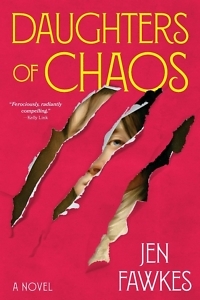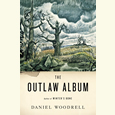The Unmatched Strength of Womanhood
Jen Fawkes spins a fiercely feminist tale centered in 19th-century Nashville
Perhaps all writers of fiction have experienced the particular thrill of coming across a bit of history or a casual mention of some peculiar event, and suddenly they know: A story will be born out of that moment. Such is the case with Jen Fawkes and her latest, Daughters of Chaos, which finds its center in Civil War-era Nashville and the decision to protect Union soldiers against syphilis by removing all “public women” — prostitutes — from the city by way of riverboat. In truth, this moment in 1863 is only a part of the magical and mysterious story Fawkes spins here, one that delves into issues of identity, sexuality, and power, all focused on a most remarkable woman, Sylvie.

When twins Silas and Sylvie are born, their mother Brigitte dies in childbirth, leaving them to be raised by their father and older sister, Marina. Years later, when Sylvie brings her own twins into the world (named after their grandmother and aunt), she, too, holds them briefly before bidding them farewell, but this time the mother survives, sending her daughters to be adopted by a nearby couple with a farm and none of the baggage of Sylvie’s past.
Sylvie needs to tell the story of her past, to tell of the years she spent in Nashville during the war, and Daughters of Chaos is framed as a letter to young Brigitte and Marina, though she admits, “‘Maybe I’ll give it to the girls. Maybe I won’t, but I plan to write the whole damn thing down.’” On its own, this synopsis might intrigue, and there would be plenty to populate its pages: love and loss, grief and war, turmoil and joy. These are the stuff of any life, and they are present in Sylvie’s tale as well.
 But Daughters of Chaos is not content to tell only one human story. Jen Fawkes has assembled a collection of tales, a chorus of women’s stories that include a lost play by Aristophanes, an ancient cult comprised of women who can change their shape at will, and, of course, the stories of those public women. It is a complex story that manages an impressive balancing act, keeping readers poised between the real and the unreal with notable continuity throughout this fiercely feminist novel.
But Daughters of Chaos is not content to tell only one human story. Jen Fawkes has assembled a collection of tales, a chorus of women’s stories that include a lost play by Aristophanes, an ancient cult comprised of women who can change their shape at will, and, of course, the stories of those public women. It is a complex story that manages an impressive balancing act, keeping readers poised between the real and the unreal with notable continuity throughout this fiercely feminist novel.
To properly tell her story, Sylvie gathers what she calls an “archive of evidence,” including “newspaper clippings, correspondence, a child’s charcoal and pastel drawings. An antique playscript that rightly belongs in the Smithsonian. A red clothbound book, published in 1828, about the Venetian poet Gaia Valentino. Volumes 3, 6, 8 ,9, 11, 14, and 21 of the Encyclopaedia Brittanica (eighth edition).” These elements lend an air of researched authenticity to Fawkes’ elaborate story, and for those readers skilled in the practice of suspending disbelief, the novel will work perfectly, casting its spell and transporting them into a fully realized world, rich with fantastic detail and the grounding layers of history.
Despite the many narrative threads employed, Daughters of Chaos maintains a persuasive throughline, insisting on the unmatched strength of womanhood and the power that resides in a willingness to change. In one of the excerpts on Valentino’s life, we read:
“To be a woman,” Francesca said as she taught her changeling how to disguise herself — how to dress and plait her hair, how to perfume and adorn her body, “is to change. From girl to maid, from bride to mother, from matron to crone. Such mutability is thought by the male of the species to be a failing, so we’ve been relegated to the shadows.
“But woman is the universe. We are the cosmos. We are the landscape. We’re the forest, the bear, the mountain, the beehive, the sea. And it is our ability to change, to adapt, to wear a series of faces that gives us our strength, that enables us — in spite of how we’re fettered by society — not only to survive but to prevail.”
And woman does prevail in Daughters of Chaos, though in a manner which might surprise, or even possibly disappoint, readers who were expecting a certain kind of triumph. Still, it is a story full of wisdom and strength, even as it focuses on uncertainties.
In her author’s note, Fawkes explains her moment of inspiration and the intense bouts of research and writing that followed. She argues, “Who better to comb through the extant record — through the stories selected and arranged by those in power — and breathe life into these lost circumstances than a writer of fiction?” Clearly Fawkes knows the power of a good story and of the imaginative hope that lives within each person’s life, an idea brought vividly to life in Daughters of Chaos.

Sara Beth West is a school librarian and a freelance writer focusing on book reviews and author interviews. In addition to Chapter 16, publications include Shelf Awareness, BookPage, Southern Review of Books, and more. She lives in Chattanooga.


